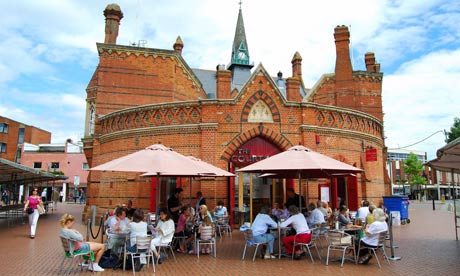
It's almost enough to make you want to pack up, move to a Berkshire market town and take your chances. According to a new report published by Public Health England, Wokingham has the lowest premature mortality rates of all local authorities in England, with 200 deaths under the age of 75 per 100,000 (Manchester, which came out worst, had 455).
Residents of Wokingham – not just the town itself, but the local authority area that covers part of Berkshire – are used to coming top in these sorts of quality-of-life surveys. According to a 2007 study by Halifax, the town was named best in Britain; average earnings of £744 a week put Wokingham residents in the top 5% earners in the country, and 84% owned their own homes, despite house prices being higher even than the south-east average. Last year, another survey named Wokingham as the best place to bring up a family, citing low crime rates and good schools.
What makes an area healthier than any other? "It's the social, cultural and economic conditions in which people are born, live, work and age, across a whole life course," says Dr Jessica Allen, deputy director of University College London's Institute of Health Equity (this latest report wasn't the IHE's, but it is similar to its previous findings). "The fact Wokingham is prosperous, has high rates of employment and good schools will all have a dramatic impact." It's a cumulative effect, she says, and includes a wide range of factors from good housing and social services, to a sense of community and opportunities for social contact. "This also shows there are plenty of things that can be done locally that really make a difference."
Kate Lole, who organises the Wokingham festival, an annual food and arts event, suggests that, aside from the affluence of the area, the strong sense of community has played a big role in local health and happiness. "For those who want to be involved, there really is something for everyone. There are music, arts, leisure groups and lots of free local events that bring the community together and get people talking to each other. I think the council really caught on to the idea about five or six years ago that these were all things that improved wellbeing."
Michael Lawrence, an entrepreneur and chair of governors at a Wokingham primary school, cites the proximity to both London and the countryside as being the best of both worlds. "You have the possibility of a career in London, as well as lovely countryside nearby and lots of active things to do outdoors," he says. "It can be stressful jumping on the commuter train, but you feel less stressed when you're here."
"It's quite a wealthy place," says Martin Gibbs, who runs the Vitality health food shop in the town. He says the fact that his shop has been going for 28 years, while others around him have closed, shows that "people are interested in their health, and have more money to spend on it. There are people who come in and don't mind spending £50 in one go [on supplements and vitamins]." He also thinks there are quite a high number of vegetarians in the town, given the amount of vegetarian food he sells. "There are a few fast-food places in the town, but not that many – it's more coffee shops," he says.
John Harrison, a bellringer and semi-retired engineer, who has lived in the town since 1967, sounds a more cautious note. "It's probably partly the regional benefits – it has affluent people, and we know the south-east is favoured in terms of investment," he says. "But my suspicion is it's also probably about the statistics – the Wokingham district is a slice of rural Berkshire that conveniently avoids the deprived areas of places like Reading and Slough." He adds that although it's a generally peaceful and happy place to live, it has its downsides: "Too many cars, and housing development pressure." Which suggests Wokingham may be becoming a victim of its own success.

